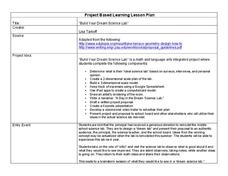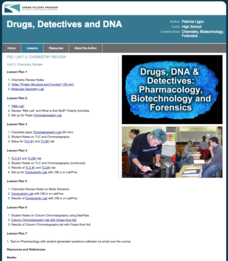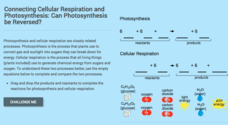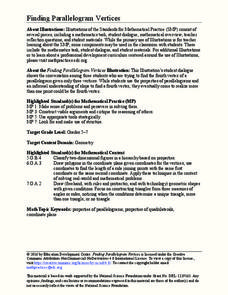National Security Agency
Awesome Area - Geometry and Measurement
Break out those math manipulatives, it's time to teach about area! Capturing the engagement of young mathematicians, this three-lesson plan series supports children with learning how to measure the area of squares, rectangles, and...
National Wildlife Federation
What is DBH?
When measuring the circumference of a tree, does it matter how high you place the measuring tape? Most scholars have never considered this question, but scientists know that measurement techniques must be standardized. The 13th lesson in...
NOAA
To Explore Strange New Worlds
It's time to boldly go where your class has not gone before! The introductory instructional activity in a five-part series takes young oceanographers aboard the NOAA Ship Okeanos to begin a study of ocean exploration. The instructional...
Voyage Solar System
Round and Round We Go — Exploring Orbits in the Solar System
Math and science come together in this cross-curricular astronomy lesson plan on planetary motion. Starting off with a hands-on activity that engages the class in exploring the geometry of circles and ellipses, this lesson...
Curated OER
Build Your Dream Science Lab
Would your ideal science lab be filled with bubbling beakers and zapping Tesla coils? Or would it contain state-of-the-art computer technology and data analysis? Dream big with an innovative lesson that connects math and language...
Curated OER
Lesson Plan Outline for Rainbow Science
Young scientists study light reflection and refraction as they determine the critical angle, the rainbow angle, and color separation in rainbows. Teams record the data they collect in a shared spreadsheet and discuss results with the class.
National Security Agency
Classifying Triangles
Building on young mathematicians' prior knowledge of three-sided shapes, this lesson series explores the defining characteristics of different types of triangles. Starting with a shared reading of the children's book The Greedy...
National Security Agency
Time After Time
Save those precious minutes and hours spent planning math lessons with this mini-unit on telling time. Offering a series of engaging hands-on and collaborative learning activities, these three lessons teach children how to read...
Illustrative Mathematics
How Many Leaves on a Tree?
This is great go-to activity for those spring or fall days when the weather beckons your geometry class outside. Learners start with a small tree, devising strategies to accurately estimate the leaf count. They must then tackle the...
Mascil Project
Circular Pave-Stones Backyard
Pack the lesson into your plans. Young mathematicians learn about packing and optimization with the context of circular paving stones. They use coins to model the paving stones, and then apply knowledge of circles and polygons to...
ConnectED
Crime Scene Investigation
How exactly does a crime scene investigation work? The resource, a unit on criminology, covers everything from the deductive reasoning skills needed for detectives to DNA fingerprinting, all the way to how to gather evidence and bring...
Kenan Fellows
Unit 2: Chemistry Review
What exactly goes into the medications people take every day? Scholars learn about the chemistry of medications in the second of a four-part series on Pharmacology. Over the course of two weeks, class members complete seven experiments,...
CK-12 Foundation
Cellular Respiration: Can Photosynthesis Be Reversed?
Cellular respiration and photosynthesis relate closely, but many don't realize how. Scholars drag and drop the reactants and products to the chemical reactions for both processes. Then they answer three multiple-choice questions.
Virginia Department of Education
Logic and Conditional Statements
If there is a conditional statement, then there is a hypothesis and conclusion. Pupils learn how to identify the parts of conditional statements. Class members continue to work with conditional statements and rewrite them in their many...
Math by Design
Transformations – Reflections
Scholars use interactive resources to figure out how to mathematically draw a reflection of a geometric shape viewed in a mirror. To conclude the activity, class members are asked to deduce the result of multiple reflections across...
Las Cumbres Observatory
The Cosmic Distance Ladder: Parallax
Scientists don't have a ruler long enough to measure to the stars, so they rely on math. Scholars learn to calculate the distance from Earth to a star using the parallax method. They use angle measures from different perspectives to...
Computer Science Unplugged
Battleships—Searching Algorithms
How does a computer perform a search in order to find data? The lesson begins with a demonstration on finding one number out of 15. Pairs then play three games of Battleship by using different search techniques. The lesson...
Illustrative Mathematics
Toilet Roll
Potty humor is always a big hit with the school-age crowd, and potty algebra takes this topic to a whole new level. Here the class develops a model that connects the dimensions (radii, paper thickness, and length of paper) of a...
National Security Agency
What’s Your Coordinate?
Your middle schoolers will show what they know with their bodies when they become the coordinate plane in this conceptual development unit. Starting with the characteristics of the coordinate plane, learners develop their skills by...
Alabama Learning Exchange
Pennies, Pennies and More Pennies
Learners determine the number of pennies needed to fill a room. For this pennies lesson plan, students work in groups to determine the number of pennies needed to fill a room. They compute the probability of the head of a pin...
Education Development Center
Similar Triangles
Model geometric concepts through a hands-on approach. Learners apply similar triangle relationships to solve for an unknown side length. Before they find the solution, they describe the transformation to help identify corresponding sides.
Education Development Center
Proof with Parallelogram Vertices
Geometric figures are perfect to use for proofs. Scholars prove conjectures about whether given points lie on a triangle and about midpoints. They use a provided dialogue among fictional students to frame their responses.
Education Development Center
Finding Parallelogram Vertices
Four is the perfect number—if you're talking about parallelograms. Scholars determine a possible fourth vertex of a parallelogram in the coordinate plane given the coordinates of three vertices. They read a conversation...
Teach Engineering
Straw Bridges
Pairs work as engineering teams to design and build model bridges from drinking straws and tape. In this third segment in a series of 10, teams compete in an attempt to build the strongest bridge. To help with the design, the groups...























